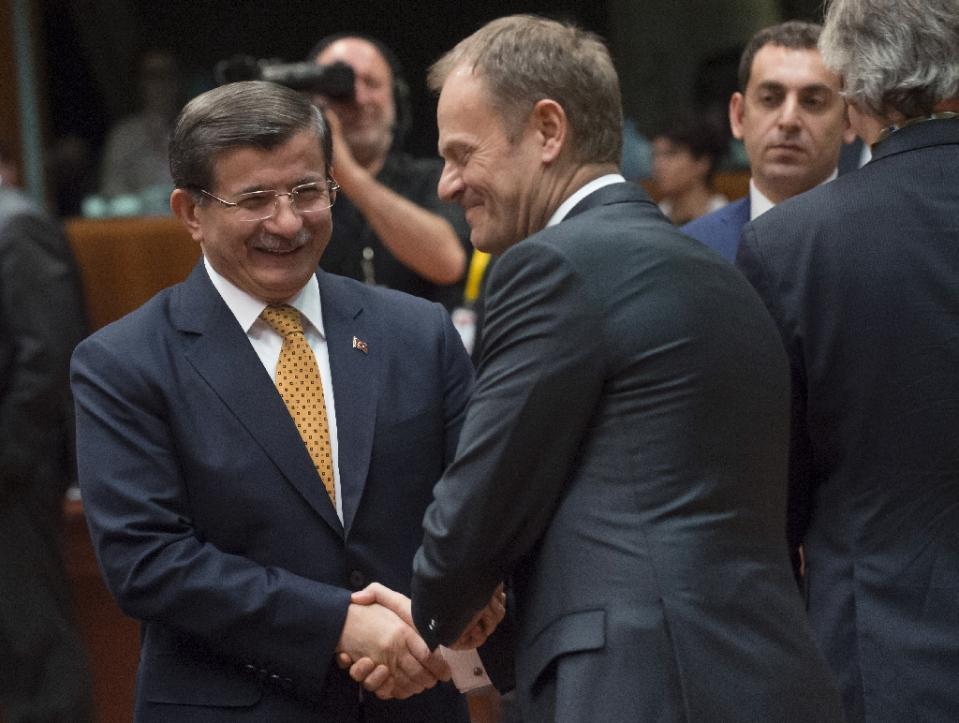
EU Turkey strike 'historic' deal to send back migrants
Brussels: Turkish and EU leaders agreed a "historic" deal to curb the huge flow of asylum seekers to Europe which will see all migrants arriving in Greece being sent back to Turkey from Sunday.
But leaders warned Friday it would be a "Herculean task" to implement the deal aimed at easing the biggest migration crisis since World War II while critics said the deal breached international law.
Turkey extracted a string of political and financial concessions from the 28-nation European Union in exchange for becoming a bulwark against asylum seekers from Syria and elsewhere.
"It is a historic day because we reached a very important agreement between Turkey and the EU" Turkish Prime Minister Ahmet Davutoglu said after striking the deal at a Brussels summit.
"We today realised that Turkey and the EU have the same destiny the same challenges and the same future."
EU president Donald Tusk said that under the deal all "irregular" migrants would be returned to Turkey from Sunday. For every Syrian refugee expelled the EU would resettle one directly from Turkey.
Tusk said the deal would only work as part of a broader plan including support for Greece the main point of entry for migrants to Europe and cutting the flow of refugees through the Balkans to Germany.
"Some may think this agreement is a silver bullet but reality is more complex" said Tusk who has played a leading role in a crisis that has seen 1.2 million asylum seekers reach Europe since January 2015.
'Herculean task'
Around 4000 people including women and children have drowned crossing the Aegean Sea in flimsy smugglers' boats including 400 this year alone.
For its cooperation to stem the flow Turkey won an acceleration of its long-stalled bid for EU membership the doubling of refugee aid to six billion euros ($6.8 billion) and visa-free travel by June.
Despite the big words there are still huge doubts about how to implement such a scheme not least due to still often-tense relations between Ankara and Brussels.
"This is a Herculean task facing us" European Commission chief Jean-Claude Juncker told the press conference. "Greece especially faces a Herculean task."
He said some 4000 border officials and other experts will need to start working immediately on implementing the deal that will cost the EU up to 300 million euros over six months.
EU officials stressed each application would be treated individually with full rights of appeal and proper oversight.
Turkish officials as well as UNHCR officials will be sent to the Greek islands to oversee the scheme.
The deal envisages major aid for Greece where tens of thousands of refugees are trapped in dire conditions after Balkan countries shut their borders.
The deal would not affect the 46000 migrants already in Greece who will either be expelled as economic migrants or granted asylum.
Greek Interior Minister Panagiotis Kouroumblis described the overwhelmed border town of Idomeni where many of the migrants are camped out as a "modern-day Dachau".
'Don't trade refugees
Amnesty International criticised the deal setting up a sign outside the summit venue saying: "Don't trade refugees".
The United Nations and rights groups fear the deal could violate international law that forbids the mass deportation of refugees.
Many EU states had meanwhile expressed concerns about Ankara's human rights record including its treatment of the Kurds and a crackdown on critics of the government.
Far from the smiles in Brussels Turkish President Recep Tayyip Erdogan blasted the EU for taking a "handful of refugees" in contrast to the nearly three million Turkey is hosting.
Erdogan also accused the Europeans of supporting the outlawed Kurdistan Workers' Party (PKK) days after a bombing in Ankara claimed by Kurdish rebels allegedly linked to the group.
"European countries are paying no attention as if they are dancing in a minefield" he said.
But one major hurdle that was overcome was opposition from Cyprus rooted in long-standing tensions with Turkey over Ankara's refusal to recognise its government on the divided island.
The crisis has left Europe increasingly divided with fears that its Schengen passport-free zone could collapse as states reintroduce border controls and concerns over the rise of populism and anti-immigrant sentiment.
British Prime Minister David Cameron was also hosting a meeting with Merkel and several other EU leaders on how to tackle migration flows from lawless Libya which appeared to be increasing again.
AFP

Legal Disclaimer:
MENAFN provides the
information “as is” without warranty of any kind. We do not accept
any responsibility or liability for the accuracy, content, images,
videos, licenses, completeness, legality, or reliability of the information
contained in this article. If you have any complaints or copyright
issues related to this article, kindly contact the provider above.


















Comments
No comment